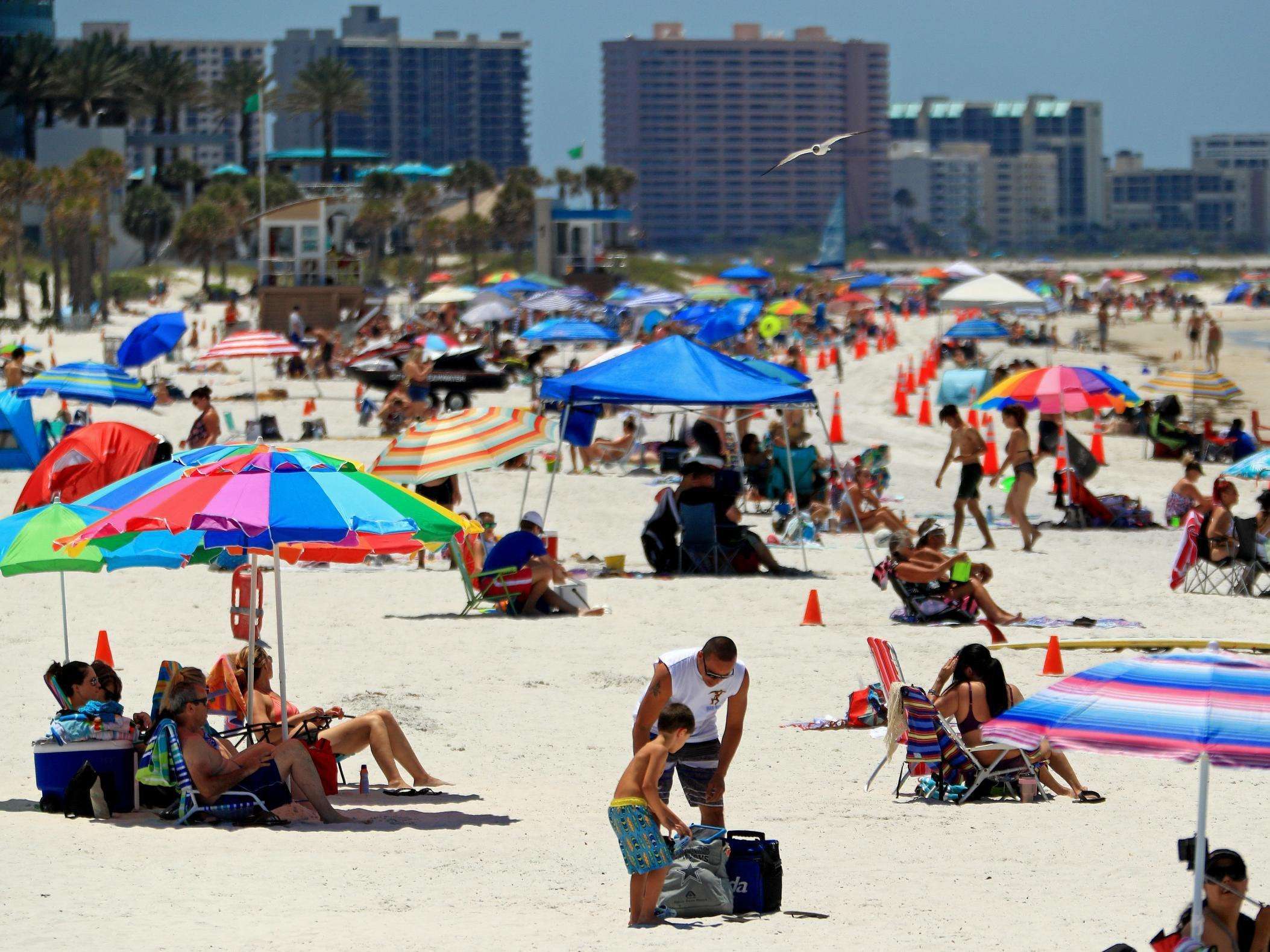Scientists say warm weather is unlikely to greatly hamper the spread of coronavirus, dashing the hopes of many — including Donald Trump — who had suggested summer could provide relief from the global pandemic.
Researchers in Canada examined the spread of Covid-19 around the world in late March in places with different humidities, latitudes and public health measures, such as social distancing.
Dr Peter Juni, of the University of Toronto, said in a press release that the team found little or no link between infection spread and temperature or latitude, and only a weak association with humidity.
Download the new Independent Premium app Sharing the full story, not just the headlines
“We had conducted a preliminary study that suggested both latitude and temperature could play a role. But when we repeated the study under much more rigorous conditions, we got the opposite result,” he said.
By contrast, school closures and other public health measures had been an effective curb on coronavirus, Dr Juni added. “Our results are of immediate relevance as many countries, and some Canadian provinces and territories, are considering easing or removing some of these public health interventions.”
“Seasonality is likely to play only a minor role in the epidemiology of Covid-19,” the study concluded.
Mr Trump is pushing hard to “re-open” his country in order to boost the economy — whose performance he has made central to his 2020 election campaign. He has previously suggested that warm weather will see coronavirus “disappear”.
In Britain, Boris Johnson is to announce on Sunday how he plans to ease the lockdown, though ministers have warned that any early steps will be minor. The UK’s chief scientific adviser, Sir Patrick Vallance, has also speculated that the virus may spread less aggressively in the heat.
Professor Dionne Gesink, an epidemiologist from the University of Toronto and a co-author of the study, said in the release: “Summer is not going to make this go away. It’s important people know that. On the other hand, the more public health interventions an area had in place, the bigger the impact on slowing the epidemic growth.”
Daily coronavirus briefing No hype, just the advice and analysis you need Enter your email address Continue Continue Please enter an email address Email address is invalid Fill out this field Email address is invalid Email already exists. Log in to update your newsletter preferences Register with your social account or click here to log in I would like to receive morning headlines Monday - Friday plus breaking news alerts by email Update newsletter preferences
The authors studied 144 regions around the world, including states in the US, Australia and Canada. They estimated epidemic growth by comparing the number of cases on March 27 with the figure from a week prior, and with a string of variables during an “exposure period” between 7 and 13 March.
Some countries were not studied. The scientists wrote: “China was excluded as its epidemic growth had decelerated and the outbreak appeared to be contained. South Korea, Italy and Iran were excluded as their epidemics were fully established, being further ahead on the epidemic curve than the rest of the world, with the possibility of reaching the hyperendemic state during the follow-up period.”
The authors noted a number of limitations in their study, first among which was that “because of considerable differences in testing practices between different geopolitical areas, actual rates of Covid-19 could not be reliably estimated”. Their research is just the latest to examine the links between disease spread and weather, and was published in the Canadian Medical Association Journal.
In April, a review of the available evidence by US experts found that summer weather was unlikely to have an effect on coronavirus’ spread. However, in March, another paper found the opposite.

thornhead on May 9th, 2020 at 03:30 UTC »
Wow, if only we lived on a globe where it was already summer in areas that were impacted by this when it broke out.
the_nin_collector on May 9th, 2020 at 00:14 UTC »
Has really given it much time have they. Here in Japan it's gone from 25 to 15 back to 25 to 10 to 20 in the last month. I've had my heater on and AC in the same week.
Jskidmore1217 on May 8th, 2020 at 23:50 UTC »
Per Kissler et al. seasonality reduces the R0 by about 20-40%. Enough to slow the spread but not enough to prevent exponential growth without additional social distancing measures.
Take it from Harvard.
https://science.sciencemag.org/content/early/2020/04/24/science.abb5793
edit
For further Harvard reading- see this website they just published today! A path forward for countries like the US.
CovidPathForward
Smarter folks than I have requested I clarify- the study on seasonality above does not conclude seasonality effects on SARS-CoV-2 specifically. Rather, it looks at viruses quite similar in nature and makes a correlation to SARS-CoV-2 for the purpose of prediction. Additional research is still needed of course.
Do note my comments are from the perspective of a laymen.